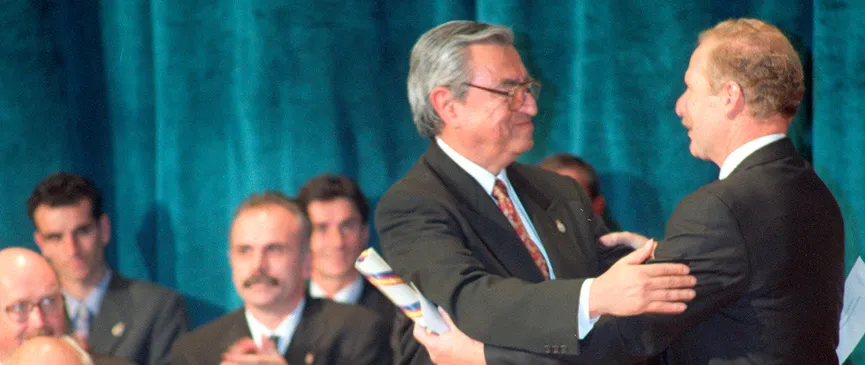Main content
Government of Guatemala and Guatemalan National Revolutionary Unity Prince of Asturias Award for International Cooperation 1997

Speech by Mr Alvaro Arzu, President of Guatemala.
Distinguished attendees,
It is a great pleasure for me to receive, on behalf of my Government, the lofty distinction that the Prince of Asturias Award supposes and to be present at this splendid ceremony held in a sister land with which we have historical ties and whose mountainous geography reminds us so much of our own.
I thank the members of the Jury for the generosity of their verdict and I do so first and foremost on behalf of the people of my land, who suffered the rigours of confrontation and made the transition to democracy possible, a transition which formed the basis for achieving peace.
I likewise consider it most fortunate that this award has been granted to my Government, as above and beyond personal leaderships, peace has been made possible thanks to a joint effort… to teamwork, within which the Guatemalan Army made an outstanding contribution.
As regards the Guatemalan National Revolutionary Unity, I wish to reiterate what I have already stated on other occasions: that we had an interlocutor moved by a patriotic spirit, one convinced of the need for peace, which made it possible to successfully bring the process to a close and overcome its major obstacles. Today the Guatemalan National Revolutionary Unity is an incipient political party that has been positively integrated in the lawful political life of the country.
To have conferred the Award for International Cooperation on both of us supposes, in my opinion, a generous evaluation of what the Guatemalan peace process has contributed and can still contribute to coexistence between nations and peoples. Peace in Guatemala is also the tangible fruit of the new era in international relations that have been established at the end of this millennium and of the international solidarity that is one of its features. For us Guatemalans, it is deeply satisfying to know that so many brother and sister countries around the world have in some measure contributed to our internal peace.
Ladies and Gentlemen,
Although there is still much to do, Guatemala is today a very different country to what it was in the past. Political violence has disappeared from our land; in its place flourishes an inclusive democracy that is releasing the creative potential of the Guatemalan people and broadening the paths of tolerance, pluralism and the opening up to new ideas and diversity.
Freedom reigns in our motherland and old wounds are healing with the disappearance of the impunity which was protected by the complicity or tolerance of power, insofar as opportunities for development are reaching a long-suffering and hardworking people who embrace modernity from the depth of their ancient cultural roots.
Peace is not the absence of conflicts, but pacific, legal and democratic methods to solve them. Firm, long-lasting peace requires social and cultural justness and that is the path that the Peace Accords have taken. The fight against poverty, privilege and discrimination is and should be a permanent national priority, because the broadening and strengthening of the unity of the Guatemalan people depend on this priority, a unity which is their main resource for building the present and the future.
It is still early to evaluate the period we have experienced and earlier still to value that which has arisen anew in our society. The urgency to overcome so much lost ground and the longing that this causes us prevent a just appraisal of what we have achieved, particularly the foundations for the future that we have built.
We still do not enjoy the necessary historical perspective to recognize the rich sediment that the tragedy itself produced, and ten months of peace after four hundred months of war are not enough to reveal that broad paths open up ahead of us, paths that our first forbears entreated with all their heart of the sky and the earth in the dawn of their lives. To tread these paths and not get lost depends on us alone.
In the effort for peace and development, we have received the generous contribution of the Spanish people and its authorities. They accompanied us throughout the negotiating process from the committed standpoint of the Group by Friendly Countries and they have not spared any effort in supporting us in the building of peace. We know that the Spanish people have followed the events of the peace process, showing their solidarity with respect to its difficulties and rejoicing with the successes achieved.
At this critical and bright moment in our national events, the historical and cultural ties with the noble people of Spain have been broadened and enriched. A tangible manifestation of this has been the pleasure and warmth with which the Guatemalan people recently received the endearing visit of Her Majesty Queen Sofia, who graced our land and uplifted us with instances of her love for Guatemala and its people.
Spain has suffered the rigours of war like few countries and in turn knows the difficulties and the invaluable achievements of the transition to democracy. Different peoples coexist in this land and different languages are spoken, all within a framework of unity that respects and propitiates the wealth of diversity. We have much to learn and share, as our Guatemala constitutes a rich natural and social mosaic that must draw its strength and identity from unity in diversity and that is only possible in a democracy.
On reiterating our satisfaction for this Prince of Asturias Award for International Cooperation, we wish to recall that cooperation is the sign of the times, because humanity faces challenges that are impossible to resolve without the aid of one and all and because mutual solidarity is the highest expression of brotherhood among human beings.
Thank you very much.
End of main content
